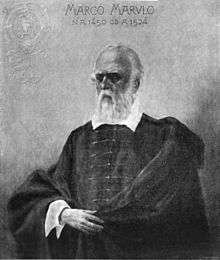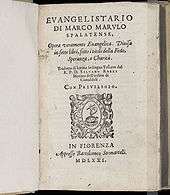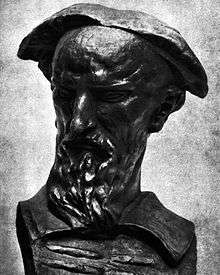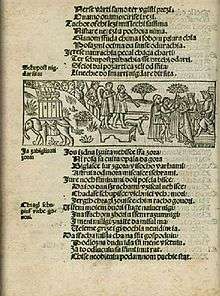Marko Marulić
Marko Marulić Splićanin (Croatian pronunciation: [mâːrko mǎrulitɕ]),[lower-alpha 1] in Latin Marcus Marulus Spalatensis[lower-alpha 2] and Italian Marco Marulo (18 August 1450 – 5 January 1524), was a Croatian poet and Renaissance humanist. He coined the term "psychology".[1][2][3]
Marko Marulić | |
|---|---|
 1903 illustration | |
| Born | 18 August 1450 Split, Republic of Venice |
| Died | 5 January 1524 (aged 73) Split, Republic of Venice |
| Occupation | poet, humanist |
| Language | Croatian, Latin |
| Period | Renaissance |
| Notable works | Judita Davidiad |
He is regarded as the Croatian national poet and has been called the "crown of the Croatian medieval age" and the "father of the Croatian Renaissance".[4]
Biography
Marulić was a nobleman born in Split, Dalmatia, coming from the distinguished aristocratic family of Pečenić (Pecinić, Picinić), the 15th century family branch whose founder was Petar, and only began calling themselves again Marulić, Marulus or De Marulis, in the 16th century.[4]
Very little is actually known about his life, and the few facts that have survived to this day are fairly unreliable. It is certain that he attended a school run by a humanist scholar Tideo Acciarini in his hometown. Having completed it, he is then speculated to have graduated law at the Padua University, after which he spent much of his life in his home town. Occasionally he visited Venice (to trade) and Rome (to celebrate the year 1500).
He lived for about two years in Nečujam on the island of Šolta. In Split, Marulić practised law, serving as a judge, examinator of notarial entries and executor of wills. Owing to his work, he became the most distinguished person of the humanist circle in Split.
Writing
The central figure of the humanist circle in Split, Marulić was inspired by the Bible, Antique writers and Christian hagiographies. Main topics of his writings were Christian theological by nature. He was a poet and writer who wrote many poems, discussions on theology and Christian ethics, stories and some epics.[4] He wrote in three languages: Latin (more than 80% of his preserved opus), Croatian and Vulgar Italian (three letters and two sonnets are preserved). Marulić was active in the struggles against the Ottoman Turks who were invading the Croatian lands at that time. He wrote, among other works, an Epistola to the Pope where he begged for assistance in the fight against the Ottomans.
Latin works

His European fame rested mainly on his works written in Latin which had been published and re-published during 16th and 17th century and translated into many languages. He published Psichiologia de ratione animae humanae containing the earliest known literary reference to psychology. He wrote De institutione bene vivendi per exempla sanctorum, a moralist tractate of Biblical inspiration which he managed to publish in 1506 in Venice; this work influenced St Francis Xavier, and it was claimed by one of Francis' associates in 1549 to be the only book that he read during his missionary work. Marulić also wrote the Evanglistarium, a systematic discourse on ethical principles that he managed to publish in 1516, and in 1517 the Davidiad a religious epic which fused Biblical motifs and antique, Virgilian poetics in 14 books, the most important being the story on the life of the Biblical King David. Unfortunately, the Davidiad was discovered only in 1924, only to be lost again and rediscovered finally in 1952. However, Marulić's Latin works of devotional and religious provenance, once adored and envied across Europe, shared the destiny that befell the Humanist genre of those centuries: they vanished into oblivion.[5]
Croatian works

In the works written in Croatian, Marulić achieved a permanent status and position that has remained uncontested. His central Croatian oeuvre, the epic poem Judita (Libar Marca Marula Splichianina V chomse sdarsi Istoria Sfete udouice Iudit u uersih haruacchi slosena chacho ona ubi uoiuodu Olopherna Posridu uoische gnegoue i oslodobi puch israelschi od ueliche pogibili) written in 1501 and published in Venice in 1521, is based on the Biblical tale from a Deuterocanonical Book of Judith, written in Čakavian dialect – his mother tongue and described by him as u versi haruacchi slozhena ("arranged in Croatian stanzas"). His other works in Croatian are:
- Suzana (Susan) – biblical poem in 780 stanzas, listing Croatian works at the end and theming Babylon Jewish woman falsely accused on adultery
- Poklad i korizma (Carnival and Lent), Spovid koludric od sedam smrtnih grihov (Nun's confession of seven deadly sins), Anka satir (Anka the satire) – secular poetry, poems dedicated to his sister Bira
- Tuženje grada Hjerosolima (Jerusalem's Lament) – anti-Turkish laments
- Molitva suprotiva Turkom (Prayer against the Turks) – poem in 172 doubly rhymed dodecasyllablic stanzas of anti-Turkish theme, written between 1493 and 1500. Poem has a hidden acrostic Solus deus potes nos liberare de tribulatione inimicorum nostrorum Turcorum sua potentia infinita, "Only God with his infinite might can save us from the misery of our enemies Turks", discovered by Luko Paljetak. The poem is assumed to exhibit influence of Juraj Šižgorić's Elegija o pustošenju Šibenskog polja and medieval song Spasi, Marije, tvojih vjernih from Tkonski miscellany. This Marulić's work influenced Zoranić's Planine – the first Croatian novel, in which ganka pastira Marula is sung alluding to Turks, and also to Petar Lučić and his work Molitva Bogu protiv Turkom, and Primož Trubar's Pjesni zuper Turke.[6]
American historian John Van Antwerp Fine, Jr. emphasizes that Marulić belongs to a group of humanist and clerics placed in the "Croat" camp who, at least at the time when they wrote their texts, did not seem to have "Croat" identity, particularly not a Croat ethnic identity.[7]
Glasgow codex
Recently discovered manuscript of Marko Marulić in the University Library, Glasgow throws a new light on his work and persona. It was discovered in 1995 by Darko Novaković and he states that in comparison with Marulić's known carmina minora the poems in the codex introduce three thematic novelties. Unexpectedly vehement, satirical epigrams are featured and the intensity of his satirical impulse is startling: even in such conventional poems as epitaphs. Three poems reveal his love of animals. The greatest revelation are the verses which show Marulić as the author of love poems. This aspect represents the most serious challenge to our traditional picture of the Poet: the last epigram in the collection is a true Priapeum marked with lascivious ambiguity.[8]


Visual artist
According to Fisković,[9] Marulić was an accomplished illustrator. In his will he leaves to his sister a book that he illustrated and conceived.[10] The second edition of Judita, prepared by Zadar publisher Jerolim Mirković, dated 30 May 1522 is adorned with nine woodcuts of which the last one is signed "M". It is assumed that the illustrations were created by Marulić himself.[11]
Currency and medals
Marulić's portrait is depicted on the obverse of the Croatian 500 kuna banknote, issued in 1993.[12]
Croatian state decoration awarded for special merits for culture, Order of Danica Hrvatska is ornamented with the face of Marko Marulić.[13]
MARUL award
Festival of Croatian Drama in Split, Croatia is named after Marulić 'Festival Marulićevi dani' (Festival of Marulić days) and gives annual MARUL awards.
Notes
- Marko Marulić Splićanin is the form he himself used to sign his works. It means Marko Marulić of Split.
- Alternative Latin forms include Marcus de Marulis and Marcus Marulus Dalmata ("the Dalmatian").
References
- Darko Zubrinic, Zagreb (1995) Croatian Humanists, Ecumenists, Latinists, and Encyclopaedists. croatianhistory.net
- "psihologija". Hrvatski jezični portal (in Croatian). Retrieved 3 June 2013.
- Vidal, Fernando (2011). The Sciences of the Soul: The Early Modern Origins of Psychology. University of Chicago Press. p. 25.
- Marulianum Center for study of Marko Marulić and his literary activity. – Retrieved on 28 November 2008.
- Moderna Vremena i Marko Marulić – Retrieved on 28 November 2008.
- Marko Marulić Archived 15 February 2009 at the Wayback Machine at HRT archives. – Retrieved on 28 November 2008.
- Jr., John V. A. Fine (1 January 2006). When Ethnicity Did Not Matter in the Balkans: A Study of Identity in Pre-Nationalist Croatia, Dalmatia, and Slavonia in the Medieval and Early-Modern Periods. University of Michigan Press. p. 273. ISBN 0-472-02560-0.
Thus it seems that identity as "Croat", and particularly one with a feeling for such as an ethnic identity, was missing - at least at the time when those men wrote their texts - in all these figures. And they I might add included two figures placed in the "Croat" camp at the beginning of the chapter: Marko Marulić and Šimun Kožić
- "Dva nepoznata Marulićeva rukopisa u Velikoj Britaniji: MS. ADD. A. 25 u oxfordskoj Bodleiani i Hunter 334 u Sveučilišnoj knjižnici u Glasgowu" (PDF). Colloquia Maruliana (in Croatian). 6. April 1997. Retrieved 28 August 2018.
- C. Fisković: O Marulićevu slikanju, Prilozi povijesti umjetnosti u Dalmaciji, Split 1986-87, str. 393-424.
- http://www.magicus.info/hr/magicus/tekst.php?id=14245
- http://db.nsk.hr/HeritageDetails.aspx?id=873
- Croatian National Bank. Features of Kuna Banknotes Archived 6 May 2009 at the Wayback Machine: 500 kuna Archived 4 June 2011 at the Wayback Machine. – Retrieved on 30 March 2009.
- File:Order of DH Marko Marulić.jpg
Further reading
| Wikimedia Commons has media related to Marko Marulić. |
| Croatian Wikisource has original text related to this article: |
- Posset, Franz; Kurian, G.T. (2011), Encyclopedia of Christian Civilization (s. v. ‘Marulus, Marcus’), Oxford: Wiley-Blackwell
- Bratislav Lučin (2008), The Marulić Reader, Split: Književni krug Split
- Mirko Tomasović (2008), Marko Marulić Marulus: An Outstanding Contribution to European Humanism; in Croatia and Europe II – Croatia in the late Middle Ages and the Renaissance: A Cultural Survey, London and Zagreb: Školska knjiga – Philip Wilson Publishers
- Dubravko Jelčić (2005), Zbornik radova o Marku Maruliću; u povodu 550. obljetnice rođenja i 500. obljetnice njegove Judite 1450.-1501.-2001 = Collected Papers on Marko Marulić. In celebration of 550th anniversary of his birth and 500th anniversary of the birth of his Judita 1450-1501-2001 (in Croatian and English), Zagreb: HAZU
- Franz Posset (2013), Marcus Marulus and the Biblia Latina of 1489. An approach to his biblical hermeneutics, Cologne: Böhlau
- Fališevac, Dunja; Nemec, Krešimir; Novaković, Darko (2000), Leksikon hrvatskih pisaca (in Croatian), Zagreb: Školska knjiga d.d, ISBN 953-0-61107-2
- Mirko Tomasović (1999), Marko Marulić Marul : monografija (in Croatian, English, French, German, and Italian), Zagreb-Split: Erasmus naklada – Književni krug Split, Marulianum – Zavod za znanost o književnosti Filozofskog fakulteta u Zagrebu
- Josip Badalić; Nikola Majnarić (1950), Zbornik u proslavu petstogodišnjice rođenja Marka Marulića 1450–1950 (in Croatian), Zagreb: HAZU
- Ivan Slamnig (1978), Hrvatska književnost u europskom kontekstu (in Croatian), Zagreb: SN Liber
External links
- Marcus Marulus Spalatensis (site of the Marulianum, Centre for Studies on Marko Marulić and his Humanist Circle
- Vita Marci Maruli Spalatensis per Franciscum Natalem, conciuem suum, composita (Latin text and French translation)
- Marko Marulić, the "father of Croatian literature"
- Links to digitized old editions of Marulić's books
- Links to works about Marulić in English, German, Italian, and Spanish
- Links to translations of Marulić's works in English, French, German, Icelandic, Italian, Portuguese, and Spanish
- Project VALMAR: Valorizzazione e recupero degli scritti e dei luoghi dell'umanista spalatino Marko Marulić/Marcus Marulus
- "Colloquia Maruliana" on Hrčak, portal of scientific journals of Croatia
- French translations of several works of Marulić
- Facsimile of the editio princeps of Judita, Venice, 1521
- Marko Marulić at Find a Grave
- Facsimile of the editio princeps of Judita, Venice, 1521
- Zadar edition of Judita with illustrations by Marko Marulić